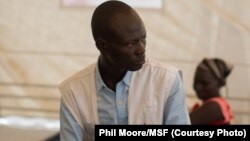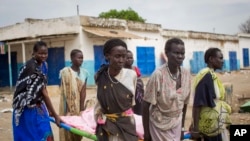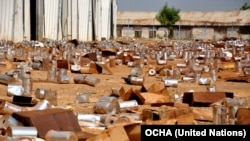Eight days after a cessation of hostilities agreement was signed for South Sudan, unrest in southern Unity state has forced thousands to flee into the bush, international medical aid group Doctors Without Borders (MSF) said Friday.
"In the past three days, the situation became too unstable and the only way to provide medical care was to take patients out of the hospital and to flee with the population into the bush," MSF head of mission Raphael Gorgeu said.
Among those who fled were some 240 South Sudanese MSF staff members, who took some of the most severely ill patients at Leer Hospital with them, the aid group said in a statement.
Patients who were able to flee on their own also left the hospital, which was completely empty on Friday, MSF said.
MSF said it was extremely worried for the safety and well-being of its staff members and patients.
The only way to provide medical care was to take patients out of the hospital and to flee with the population into the bush.Doctors Without Borders on new displacements in South Sudan
"Leer Hospital was the only fully functioning hospital in southern Unity State, and now that it is no longer safe to work in this medical facility, more than 270,000 people have no access to health care," Gorgeu said.
Since the current crisis began in December, more 860,000 people in South Sudan have been forced to flee their homes, according to a report released Friday by the U.N. Office for the Coordination of Humanitarian Affairs (OCHA).
An estimated 740,000 people are displaced inside South Sudan, with the largest increase in the past week in Unity state, in particular in oil-producing Leer and Koch counties, OCHA said. Another 123,400 people have fled to neighboring countries.
MSF said that more than 10,000 people who had been displaced by fighting in the Unity state capital, Bentiu, and fled to Leer have been displaced a second time by the recent fighting.
"The longer the population lives out in the open without adequate food, clean water or shelter, the more vulnerable they become to disease outbreaks and malnutrition," the medical aid group said.
During a visit to South Sudan this week, U.N. humanitarian chief Valerie Amos said some 3.7 million South Sudanese are "severely food insecure." Prior to the outbreak of fighting on Dec. 15, that number was one million, the U.N. Humanitarian Coordinator in South Sudan, Toby Lanzer, said in a tweet.
The number of civilians with acute & emergency food needs in #SouthSudan has risen from 1 million before 15 December to well over 3 million.
— Toby Lanzer (@tobylanzer) January 29, 2014
The warring sides in South Sudan signed two agreements in Addis Ababa last week -- one to cease fighting and the other on the status of 11 political figures who were detained when the unrest erupted in mid-December.
Seven of the 11 political detainees have been conditionally released to the custody of the Kenyan government, but South Sudan has said it has evidence to charge the remaining four with treason.
Although the cessation of hostilities agreement called for fighting to stop within 24 hours of the pact's signing, there have been reports of clashes around South Sudan, particularly in Jonglei, Unity and Upper Nile states, which have seen some of the heaviest fighting of the six-week conflict.
MSF repeated calls made in the cessation of hostilities agreement for parties to the South Sudan conflict to allow aid organizations access to affected communities, and allow patients to receive medical treatment irrespective of their origin or ethnicity.
The medical aid group two weeks ago suspended activities in Malakal, in Upper Nile state, after its facilities there were looted and its staff threatened.
A week earlier, MSF's compound in Bentiu.
MSF Executive Director Arjan Hehenkamp told VOA early this week that, in the largest state in South Sudan, Jonglei, only the town of Lankien still has a functioning secondary hospital after the medical facilities in the provincial capital, Bor, and the town of Akobo were closed because of heavy fighting.














